|
|
|
Sort Order |
|
|
|
Items / Page
|
|
|
|
|
|
|
| Srl | Item |
| 1 |
ID:
093664
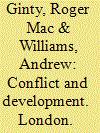

|
|
|
|
|
| Publication |
London, Routledge, 2009.
|
| Description |
x, 209p.
|
| Series |
Routledge perspective on development
|
| Standard Number |
9780415399371
|
|
|
|
|
|
|
|
|
|
|
|
Copies: C:1/I:0,R:0,Q:0
Circulation
| Accession# | Call# | Current Location | Status | Policy | Location |
| 054720 | 338.9/GIN 054720 | Main | On Shelf | General | |
|
|
|
|
| 2 |
ID:
154111
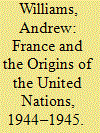

|
|
|
|
|
| Summary/Abstract |
During their long exile during 1940–1944, various components of the “Free French” were largely kept out of the “Post-War Planning” process that took place in the American State Department. They perceived this absence as a major, and often deliberate, humiliation that made the circumstances of their exile all the more exasperating. Charles de Gaulle was seen by the “Anglo–Saxon” Allies as a figure of dubious worth and usefulness, and Washington’s general tone was to dismiss the exiles as the “so-called Free French.” They were admitted to the decision-making process only slowly and grudgingly, and not until after many of the key decisions about organising the United Nations had been taken. This article shows how that exclusion affected the French leadership, how they reacted, and suggests some lasting results. It also assesses to what extent France had a coherent contribution to the formation of a global international organisation during 1943–1944, and what factors inhibited France properly articulating that contribution.
|
|
|
|
|
|
|
|
|
|
|
|
|
|
|
|
| 3 |
ID:
068573
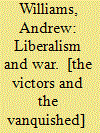

|
|
|
|
|
| Publication |
London, Routledge, 2006.
|
| Description |
263p.
|
| Series |
New international relations
|
| Standard Number |
0415359805
|
|
|
|
|
|
|
|
|
|
|
|
Copies: C:1/I:0,R:0,Q:0
Circulation
| Accession# | Call# | Current Location | Status | Policy | Location |
| 051077 | 372.172/WIL 051077 | Main | On Shelf | General | |
|
|
|
|
| 4 |
ID:
101062
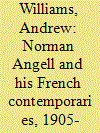

|
|
|
|
|
| Publication |
2010.
|
| Summary/Abstract |
On the occasion of the Centenary of the publication of Norman Angell's The Great Illusion, this article explores the extent to which Angell was influenced by his French contemporaries. He was living in France for the ten years previous to the book's publication and working as a newspaper editor and commentator. The main currents of French political thinking of that period are explored. The main conclusion reached is that Angell had little impact on French thinking at the time and it had not much on him. But it is argued that the reasons for this seeming mutual ignorance had profound effects on the development of thinking about international relations before 1914 and continue to haunt the way we think about IR in the "Anglo-Saxon" countries and in France itself.
|
|
|
|
|
|
|
|
|
|
|
|
|
|
|
|
| 5 |
ID:
054251
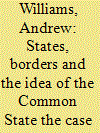

|
|
|
| 6 |
ID:
114166
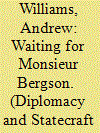

|
|
|
|
|
| Publication |
2012.
|
| Summary/Abstract |
This analysis follows upon an article that previously was published in Diplomacy and Statecraft (2010) on Norman Angell's relationship with French thinking and political life. These two papers suggest international historians should look much more widely for our sources of understanding the policy options of the Powers in the early twentieth century than the habitual diplomatic documents and the like. They also aim to explore how ideas become policies, seen through the eyes of particular key actors. This analysis looks at the relations between the French philosopher, Henri Bergson, and a contemporary major American intellectual, Nicholas Murray Butler, between 1913 and 1932 using their letters as a basis. Bergson's fraught relationship with Butler sheds some light on Franco-American relations during the turbulent decades they knew each other. The article also looks at the thinking of James T. Shotwell, a long-time collaborator with Butler and, more generally, at the approaches to the contemporary international relations of their day that underpin and mark out American and French differences about how to construct a global order after the First World War.
|
|
|
|
|
|
|
|
|
|
|
|
|
|
|
|
|
|
|
|
|